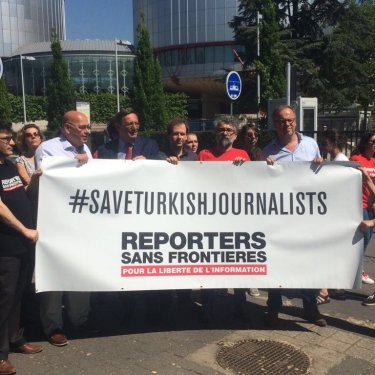Turkey’s imprisoned journalists pin hopes on European Court

Members of Reporters Without Borders (RSF) and the well-known Parisian street artist C215 painted the portraits of ten imprisoned Turkish journalists and deployed a #SaveTurkishJournalists banner outside the European Court of Human Rights (ECHR) in Strasbourg today to urge the court to intercede on behalf of journalists detained in Turkey.
C215, whose real name is Christian Guémy, used stencils to paint the portraits of Murat Aksoy, Şahin Alpay, Ahmet Altan, Kadri Gürsel, Nazlı Ilıcak, Musa Kart, İnan Kızılkaya, Tunca Öğreten, Ayşenur Parıldak and Ahmet Şık outside the court. They have been held for between five and ten months. Two of them are more than 70 years old.
Turkey’s journalists are turning to the ECHR because of the politicization of their country’s judicial system. The court is an offshoot of the Council of Europe, of which Turkey is a full member.
“Our presence here is an appeal for help,” RSF secretary-general Christophe Deloire said. “Scores of media professionals, who include some of the most famous names in Turkish journalism, have been languishing in prison for months just for doing their job. President Erdoğan’s draconian policies and arbitrary measures under the state of emergency have trampled on their rights. In the face of this denial of justice, all hope rests with the ECHR.”
Erol Önderoğlu, RSF’s Turkey representative, said: “We respectfully appeal to the judges to examine the cases of these journalists as quickly as possible. This is an emergency. What these prisoners and their families are experiencing is tragic. They have been attacked economically and psychologically.”
ECHR – court of last resort
With more than 100 journalists detained, Turkey is now the world’s biggest prison for media personnel. Most of the detained journalists were arrested under the state of emergency that was declared immediately after the abortive coup attempt in July 2016. They are all being held pending trial.
The use of pre-trial detention is supposed to be exceptional. It is supposed to be limited to specific circumstances and to the existence of specific dangers. But the Turkish judicial system is using pre-trial detention in a systematic and arbitrary manner that amounts to a form of political punishment and revenge. Legal appeals against the detention of journalists are rejected automatically, without receiving any serious consideration.
The ten-month-old state of emergency and a mass purge of the judiciary have resulted in a judicial system in which the politicization and lack of independence have reached an unprecedented level. Turkey’s constitutional court, which once played a key role in trying to ensure respect for free speech, is now paralyzed. It has yet to issue any decision on the many cases of detained journalists that have been referred to it.
Because of the absence of any effective recourse in Turkey, the lawyers of many imprisoned journalists have turned directly to the ECHR, whose decisions are binding on the Turkish authorities.
The ECHR has announced that it is examining some 15 cases as a matter of priority, including Deniz Yücel’s, but it has yet to issue any ruling. A decision must first be taken on the admissibility of each case before detailed examined of its substance can begin.
Three days of action for Turkey’s imprisoned journalists
Today’s demonstration concludes three days of action by RSF and C215 in support of journalists imprisoned in Turkey, in which the famous street artist used stencils to reproduce the ten portraits across the Parisian urban landscape.
More than 500 #SaveTurkishJournalists stencils were distributed in Paris with the aim of allowing anyone to use them to show their solidarity and support for journalists imprisoned in Turkey. Their photos were also shared on Twitter with the #SaveTurkishJournalists hashtag.
Turkey is ranked 155th out of 180 countries in RSF’s 2017 World Press Freedom Index. The media freedom situation was already worrying but has become critical under the state of emergency in effect since the July 2016 coup attempt and the country is now experiencing an unprecedented crackdown.
Nearly 150 media outlets have been eliminated at the stroke of pen, reducing media pluralism to a handful of low-circulation newspapers. Even journalists who not been jailed are being subjected to arbitrary treatment that includes judicial proceedings, withdrawal of press cards, cancellation of passports and seizure of assets. Censorship of the Internet and social networks has also reached unparalleled levels.



